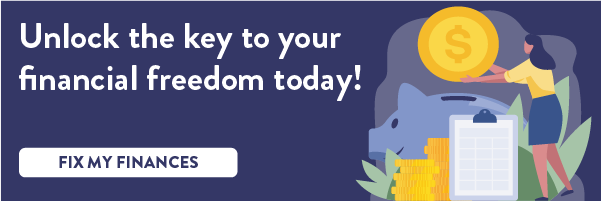When a family has mounds of debt, it can be challenging to conquer. If you're not careful, credit card balances or student loan debt may grow instead of shrinking.
Holding significant amounts of debt makes it harder to save money or invest for the future, as any extra dollars go toward paying down debt instead.
How debt can hurt you in the long-term
Debt is a major problem for many Americans because it causes them to spend money they don't have. It also makes it hard for them to stash money away for future needs.
When you take out a loan or use your credit cards, you generally pay extra (interest) to borrow money from someone else. You also give up some control over how you'll pay back the money when you borrow it.
And if you can't afford to repay the loan or make the minimum payment each month, you'll face several negative consequences, which vary depending on the type of debt.
The obstacle with high levels of debt is that it leads to a vicious cycle: You borrow money to pay off your debts, which increases your debt level even further. This cycle makes it harder to get out of debt because you have less cash each month, and you also have less money available to tithe, save, invest, or make any future purchases.

Here are a few reasons debt can quickly become dangerous:
- Carrying a credit card balance can be a sign of spending more than you earn and using credit to make ends meet.
- Buying things now with future income assumes you'll be earning a similar or higher income later. Yet, future income is never a sure thing. Your desire or ability to earn money may change.
- When you're in debt, you have less control. You become more dependent on a paycheck, which means relying on other people to keep you in business or employed.
- Financial arguments are often the number one cause of rocky relationships and may even jeopardize your marriage and health.
- Making payments to others means you're helping to build their wealth, not your own.
When you accumulate too many debts, you may find yourself unable to repay them all at once. At that point, you're likely under a considerable amount of financial stress, which impacts your relationships and your physical and mental health.
This is when many people may consider some type of debt consolidation in hopes of gaining a little breathing room in their monthly budgets.
How does debt consolidation work?
Consolidation involves combining multiple types of debt into one new loan, so you only need to make one payment per month. This strategy aims to help you avoid defaulting on your loans by making it easier to handle all your debt payments at once.
You may consider consolidating your debt if you've been struggling to repay your bills on time. However, there's no guarantee that debt consolidation will improve your situation. In fact, it could do just the opposite. Your current debt situation should be evaluated carefully.
Types of debt you can consolidate
Multiple high-interest liabilities are merged into a single loan when combining debt, resulting in a single monthly payment. Often those liabilities include:
- credit card debt
- student loans
- medical debt
- personal loans
- payday loans
DIY approaches to merging your debt
There are several ways to consolidate the types of outstanding debt mentioned above. When you DIY debt consolidation, you may also be able to include secured high-interest debt such as auto loans.
Here are common options:
- Balance Transfer Credit Card - You open a line of credit with a credit card company at a lower interest rate, possibly even 0% APR. You then merge accounts by performing a credit card balance transfer from your existing cards to this new credit card account. Your new outstanding balance is the total of all your earlier debts, but you're now able to pay down these amounts with one monthly payment and the added advantage of paying little to no interest.
- Personal Loan - This option is an unsecured loan that combines various debts into one. Many reputable companies offer personal loans for this purpose. LightStream, SoFi, and Credible are a few lenders to consider, but you can also check with your local credit union or online bank for their rates. If you have a decent credit score, you may be able to lock in an interest rate in the single digits. But be on the lookout for scams. Fraudsters know that those under financial stress are easy victims. If an offer sounds too good to be true, it probably is.

- Home Equity Loan or Home Equity Line of Credit (HELOC) - You may be able to secure a home equity loan or line of credit if you own a home, have not been late on an existing mortgage, have a credit score of at least 700, and have equity built up in your home. The home equity loan will come with a fixed interest rate, a set term, and a fixed payment that won't vary each month. A HELOC, on the other hand, will come with a credit limit, and an interest rate, and a monthly payment that varies. Because both options are secured by your home, you'll want to be uber-confident you won't have any trouble paying them back. You may also be able to find lenders who'll cover your origination fees and closing costs for this type of financing.
- Cash-Out Mortgage Refinance - Another option for homeowners is to refinance an existing mortgage and take out equity in the home to pay off other debts. When mortgage rates are low, this is an attractive option. But remember, you're now extending the period of time it will take to own your home free and clear.
- Retirement Savings Account Loan or Withdrawal - While we don't typically recommend tapping a retirement account because it inhibits your ability to grow wealth for your future, for some people, it could be an option worth investigating. With a 401(k) loan, you'll "borrow" money from your account to pay off your debts and then make payments with interest to your 401(k) until you repay the loan in full. Alternatively, when you "withdraw" money from a retirement account before the age of 59 1/2, you'll pay a 10% penalty plus regular income tax on the amount you take out. While there's no requirement to "repay" a withdrawal, any money you take out impacts the power of compounding interest which could mean a lot less money for your retirement years.
- Student Loan Consolidation - Consolidating student loans is slightly different depending on the type of student loans you have.
- Federal Student Loan Consolidation - Through the Department of Education, you can merge multiple federal student loans into a single federal loan. While this consolidation process doesn't lower your interest rate, it does allow you to move to a single payment each month.
- Private Student Loan Consolidation - Private student loan consolidation, aka student loan refinancing, can be completed with a private lender to qualify for a lower interest rate and single loan payment. But keep in mind that you may end up with a variable rate that can fluctuate over time and that if you plan to pay off federal loans, you may no longer qualify for specific repayment programs or plans. This includes income-driven repayment plans and federal student loan forgiveness programs.
Debt Consolidation with Outside Help
When your credit score is poor, or your DTI (debt-to-income ratio) is too high, you likely won't qualify for a new loan or line of credit to pay down your debt. This is when many people explore options offered by third-party companies.
- Credit Counseling/Debt management - This repayment plan is set up and managed through a credit counselor. You'll want to be sure to use an accredited counselor or one through a Federally approved agency. Your counselor will help you create a debt management plan (DMP) to pay off your unsecured personal debts. A DMP term is generally 3-5 years, and you cannot obtain any new loans while a DMP exists.
- Debt settlement - In this scenario, a debt settlement, debt relief, or credit counseling company negotiates with creditors on your behalf to reach a lump-sum "settlement" of your outstanding debts. However, there may be more risks than benefits with a debt settlement arrangement, so be sure to do your research.
- Bankruptcy - Anyone considering personal bankruptcy must first go through credit counseling and pass a means test. Since this is a drastic legal action overseen by the Federal Court System, it should not be taken lightly. Your bankruptcy eventually becomes a public record too, so it can affect your future in several ways besides just affecting your credit.
Pros of debt consolidation
- Lower interest rate - most often, you'll be securing a new loan or line of credit with a rate much lower than what you're currently paying on your unsecured debt.
- Repair credit - combining multiple credit card account balances into one lower interest rate loan should help accelerate your debt paydown and improve your credit utilization. This, combined with making payments on time, will improve your credit score.
- Simplify - one monthly payment with one due date is easier to manage vs. multiple payments with varying amounts and due dates.
- Fit your monthly budget - merging your debts into one loan allows you to find a monthly payment amount you can manage.
- Pay off liabilities quicker - with a lower interest rate, more of your money is going to debt principal instead of the lender. This enables you to pay off your debt faster.
Cons of consolidating debt
- Fees - you may have to pay up-front fees including, balance transfer fees, application fees, or management costs, depending on the type of loan and lender you work with.
- Hard credit check - securing a new loan means companies will run your credit to determine your creditworthiness. This action can further reduce your credit score.
- Extending repayment period, costing you more - to find a payment that fits your monthly budget, you may need a longer-term loan. Depending on the interest rate you obtain, it may be more expensive for you more in the long run.
- Missing a payment can worsen the damage - if you do not make prompt payments, you may risk more harm to your credit, risk losing your property securing the debt, or ultimately cause you to pursue bankruptcy.
- Doesn't work if behaviors/habits don't change - debt consolidation can help you manage your liabilities to rid yourself of them. Yet, if you continue to spend more than you earn and don't learn to control your finances more effectively, you'll have a tough time paying back your loan.
- You could dig a deeper hole - if you don't learn to manage your money and you continue to live above your means, you'll not only struggle to repay your loan, but you'll also be going further into debt.
Debt consolidation can make sense when:
- You have substantial or multiple high-interest rate debts
- Your credit score is 580 or above
- You're committed to eliminating your debt and not incurring more
- The monthly payment fits within your budget
A debt consolidation loan may not be the best move:
- When your credit score is extremely low and the interest rate you're offered is higher than what you're currently paying
- When you can't afford the loan payments (a debt management plan or debt relief plan may be necessary)
- When undue hardship makes bankruptcy unavoidable

10 Steps to follow for a debt consolidation solution
If you need to take control of your finances and are considering combining several types of debt you're liable for, follow these steps to find a solution that works for you.
- Document - List all your debts (both unsecured and secured loans) with their current outstanding balance, interest rate, monthly payment, and loan terms. Then, total the overall sum of your outstanding liabilities.
- Calculate - Figure out how many months it would take to pay off all the money you owe if you did not combine your debts.
- Review - What is your current credit score? What is your credit utilization rate? Does your credit history show delinquent payments or missed loan payments in the past 7 years? Are there other red flags in your current credit report that could hurt your chances of obtaining a new loan at a lower interest rate?
- Explore - After considering the pros and cons of the various debt consolidation solutions mentioned above, create a list of those you would consider using and have a realistic chance of qualifying for in your order of preference.
- Research - Investigate the different types of loans you would consider. Start a list of loan types, lender information, interest rates, terms available, and fees charged.
- Compare - Once you've narrowed down your options, compare each option's features and costs against one another-including interest rates, annual percentage rate (APR), term length, and fees. Look beyond just the monthly payment amount to find what the loan will cost you. It would be best if you also looked at the lenders' reputations and customer service ratings.
- Apply - Contact the lenders you've chosen and ask about the application process. Ask questions such as "How long will it take to get approved?" and "What happens after I'm approved?". If you choose to use an online application service, read reviews and ratings from other users before applying. When you feel comfortable with the lender and a loan offer, apply! Your application will include details about your financial situation, including your income and expenses, assets, and other relevant data.
- Negotiate - When you receive a loan offer, negotiate the repayment terms to ensure you get the best deal. Ask about late payment fees and prepay options or penalties. Request a pre-payment penalty waiver if applicable. Be sure to understand the fine print before signing, so you don't end up paying too much.
- Payoff - As soon as possible, start making regular payments towards your combined loan. Keep track of your progress by tracking your payments in a spreadsheet or color chart.
- Monitor - Continue watching your account to ensure everything goes smoothly. Check your statements regularly for errors and contact your lender immediately if something seems amiss. Also, review your credit report regularly for errors and fraudulent activity.
- Celebrate - Take time to celebrate when you reach your goal. It's important to recognize your hard work and success.
- Save - Divert those debt payments to saving and investing accounts now to improve your financial health even more and save for your future!
Final Thoughts
When you feel like you can't dig your way out of your vast financial hole, it's time to think about debt consolidation. While it isn't the right move for everyone, it may help you tackle your debt and gain ground on becoming more financially fit.
Keep in mind that rushing to merge your debt could cause more harm than good. Don't fall for any schemes with high fees or complicated repayment terms, or worse yet, plans that won't actually help you combine account balances and simplify your debt payoff.
When you gain access to funds to combine your liabilities or get outside help to develop a debt payment plan, sticking to it is your next challenge. Keep your goals in focus and remember that your debt paydown may be more of a marathon than a sprint. But crossing the finish line to becoming debt free is priceless!







